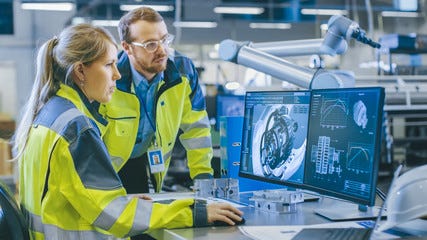A survey of mechanical engineers found a wide gap between what they seek in their careers and what they are actually experiencing.
August 5, 2020

During the prolonged days of the seemingly endless pandemic, mechanical engineers are getting restless. The staffing and recruiting company, Aerotek, recently surveyed of more than 150 full-time and contract mechanical engineers across several industries and found that most respondents were not satisfied with their employers.
Aerotek collaborated with the market research firm, MDRG, to ask mechanical engineers to rate the importance of 23 factors and report on how well their current employers were delivering on them. The company also asked mechanical engineers what it would take to make them happy.
Here are the top five factors, in order of importance, that respondents offered as ways companies can improve their relations with mechanical engineers:
Employ managers who care about the engineer’s career
Offer opportunities for growth and advancement
Offer clear communication about performance
Offer clear communication about expectations
Offer transparent communication about the job and the company
What Was Unexpected in the Results?
When asked what he found to be the most surprising aspect of the responses to the survey, John Flanigan, VP of Strategic Operations or Engineering & Sciences at Aerotek, pointed to the largest job complaint. It’s about managers.
“The engineers’ number one want or need is for a manager to care about the engineer’s career. While I don’t find this surprising, I was disappointed to see that it ranks so high,” Flanigan told Design News. “The huge gap between desire and delivery suggests managers and companies have a lot of work to do to engage and retain their talent. They should be focusing their energy on improving management skills.”

He noted that an engaged manager can have significant impact on whether the engineer enjoys the job.
“An invested manager significantly outranks other factors in importance and can be tied to the other three most important factors: recognition for the work; clear communication about performance; and clear communication about expectations,” said Flanigan.
What Was Completely Expected?
When asked what he most expected from the results, he indicated the third-most desired factor: Clear communication about what’s expected.
“We see that factor ranking high with workers of all types,” said Flanigan. “They want more performance feedback than they get, and not just in formal reviews but throughout their careers. They want an honest assessment of how they’re doing and how they can improve.”
He went further to explain that employees need to feel that they are valued and that they are achieving their goals as well as contributing to the success of the team, department, and organization.
“At Aerotek understand the importance of soliciting and giving performance feedback regularly to improve employee engagement, productivity, commitment, and retention,” said Flanigan. “For the past seven years, we’ve surveyed our own contractors and clients in order to better understand how we are delivering on their wants and needs.”
Satisfaction Specific to Mechanical Engineers and Their Jobs
As for how the needs of mechanical engineers play out across different roles in an oprganization, the survey found a difference between contract engineers and employed engineers.
“We noticed a striking difference in job satisfaction between contract and full-time mechanical engineers. Contract engineers are significantly more likely to report feeling happy with their job and employer,” said Flanigan. “Many more contractors report enjoying the work, and more than twice as many reported that the job is a good match for their skills. That makes sense when you think about how contract assignments work: You find exactly the right person for the project. You find out who has the right skills and who wants to do it? Full-time employees don’t have the luxury of choosing their projects.”
If job dissatisfaction is widespread among full-time mechanical engineers, what should these engineers look for when choosing a job?
“Mechanical engineers should really look closely at nuances about the environment and potential manager. If the manager is a great communicator, giving lots of information about the job details during the interview process, that’s a good sign,” said Flanigan. “Engineers can also take steps to find out more. Use the interview to determine the level of importance the manager puts on coaching and employee growth and development. If you’re working with a recruiter, ask about other contractors’ experiences working for the manager.”
Aerotek hosts the engineering job site: Overcoming Inertia: Propelling Mechanical Engineering Careers Forward. The site was designed to compare the main industries that employ mechanical engineers and offer alternative career options for job seekers.
Rob Spiegel has covered automation and control for 19 years, 17 of them for Design News. Other topics he has covered include supply chain technology, alternative energy, and cyber security. For 10 years, he was owner and publisher of the food magazine Chile Pepper.
About the Author(s)
You May Also Like





